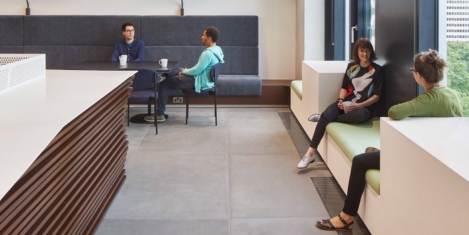March 1, 2018
BIFM to change its name to reflect greater focus on workplace issues and pursue chartered status
 The British Institute of Facilities Management (BIFM) has today announced plans to embrace ‘workplace’ as a key ‘differentiator’ for its members and to help establish facilities management as a chartered profession. The manifesto for change announced by BIFM Chair Stephen Roots, sets out to ‘reposition facilities management, emphasising its ability to make a real contribution to organisations’ performance’. It sets the Institute the ‘twin tasks of helping members to improve their skills and their status to meet the needs of modern organisations, and to raise the profile of facilities management and the understanding of the value it contributes’. The proposed new name is the Institute of Workplace and Facilities Management (IWFM).
The British Institute of Facilities Management (BIFM) has today announced plans to embrace ‘workplace’ as a key ‘differentiator’ for its members and to help establish facilities management as a chartered profession. The manifesto for change announced by BIFM Chair Stephen Roots, sets out to ‘reposition facilities management, emphasising its ability to make a real contribution to organisations’ performance’. It sets the Institute the ‘twin tasks of helping members to improve their skills and their status to meet the needs of modern organisations, and to raise the profile of facilities management and the understanding of the value it contributes’. The proposed new name is the Institute of Workplace and Facilities Management (IWFM).















 Corporate real estate departments need to become more effective partners in the agile transformation of their broader organizations., claims a new survey conducted by CBRE, in partnership with CoreNet Global. When describing Portfolio Agility, i.e. the ability to rapidly adapt, scale and reposition the organization’s real estate portfolio to support shifting enterprise needs, 67 percent consider portfolio agility as the most important type of agility for business success, yet only 14 percent consider themselves highly agile in this area. The most prevalent portfolio agility practices included negotiating flexible space options in the lease, seeking shorter and/or more flexible lease terms, supporting an enterprise-wide flex-work program and delivering free address work environments. The report states that new workplace guidelines for efficiency have altered the way companies plan for density and more occupiers are incorporating third-party ‘agile space’ into their overall real estate strategy.
Corporate real estate departments need to become more effective partners in the agile transformation of their broader organizations., claims a new survey conducted by CBRE, in partnership with CoreNet Global. When describing Portfolio Agility, i.e. the ability to rapidly adapt, scale and reposition the organization’s real estate portfolio to support shifting enterprise needs, 67 percent consider portfolio agility as the most important type of agility for business success, yet only 14 percent consider themselves highly agile in this area. The most prevalent portfolio agility practices included negotiating flexible space options in the lease, seeking shorter and/or more flexible lease terms, supporting an enterprise-wide flex-work program and delivering free address work environments. The report states that new workplace guidelines for efficiency have altered the way companies plan for density and more occupiers are incorporating third-party ‘agile space’ into their overall real estate strategy.


 In a workplace dominated by insecurity, gig work and intelligent machines we need to improve our understanding of their potential impact on health, safety and wellbeing claims a new report.
In a workplace dominated by insecurity, gig work and intelligent machines we need to improve our understanding of their potential impact on health, safety and wellbeing claims a new report. 

 The majority of employers want students to have work experience to help acquire leadership skills, yet not even a third say they actually offer placements. This is according to new research published today by the Chartered Management Institute (CMI) which is calling on employers to collaborate with business schools and universities in creating courses to provide future leaders. The Chartered Management Institute’s 21st Century Leaders report found that seven in 10 (70 percent) of prospective employers now want management, enterprise and leadership modules made available to all higher education students to improve their work-ready skills. Two-thirds (66 percent) of employers say they want to see graduates achieve professional qualifications as well as their main degree. The growing emphasis on graduate employability has been driven by employers concerned about skills shortages, with 82 percent of employers reporting problems recruiting managers. A majority of managers (85 percent) said work experience should be embedded into courses to help develop these skills and make students more employable. Yet only 29 percent of businesses work with business schools to offer placements.
The majority of employers want students to have work experience to help acquire leadership skills, yet not even a third say they actually offer placements. This is according to new research published today by the Chartered Management Institute (CMI) which is calling on employers to collaborate with business schools and universities in creating courses to provide future leaders. The Chartered Management Institute’s 21st Century Leaders report found that seven in 10 (70 percent) of prospective employers now want management, enterprise and leadership modules made available to all higher education students to improve their work-ready skills. Two-thirds (66 percent) of employers say they want to see graduates achieve professional qualifications as well as their main degree. The growing emphasis on graduate employability has been driven by employers concerned about skills shortages, with 82 percent of employers reporting problems recruiting managers. A majority of managers (85 percent) said work experience should be embedded into courses to help develop these skills and make students more employable. Yet only 29 percent of businesses work with business schools to offer placements.











February 28, 2018
The very idea of good work in a gig economy remains a distant ideal
by Tonia Novitz, Alan Bogg et al • Comment, Flexible working
More →